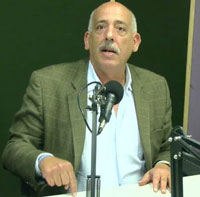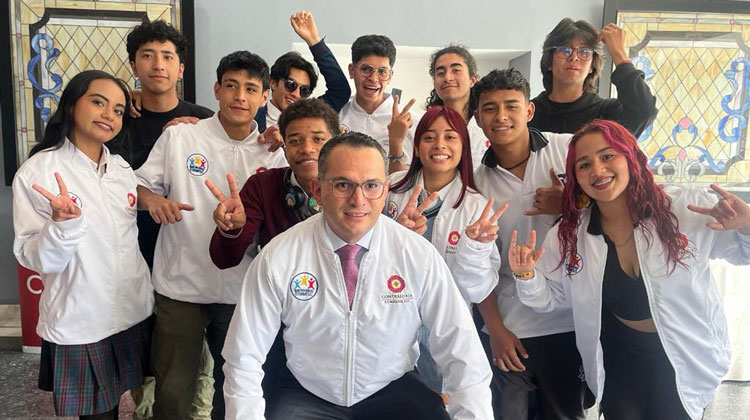若者たちがリーダーシップを発揮!(腐敗防止に挑むコロンビアの若者たち)

執筆者:ロベルト・トロバホ・エルナンデス
 想像してみてほしい。教室で生徒たちが学んでいるのは、数学や歴史だけではない。地域の財産を守る方法、公的資金の使い道をチェックする方法、そして幼いころから透明性の文化を育む方法だ。これは理想論ではない。実際にボゴタ市をはじめ、コロンビア各地で行われている取り組みなのだ。
想像してみてほしい。教室で生徒たちが学んでいるのは、数学や歴史だけではない。地域の財産を守る方法、公的資金の使い道をチェックする方法、そして幼いころから透明性の文化を育む方法だ。これは理想論ではない。実際にボゴタ市をはじめ、コロンビア各地で行われている取り組みなのだ。
「学生監査官」として活動することを通じて、倫理や反腐敗の精神を持った新しい世代がコロンビアの首都で育ちつつある。この教育の変革を推し進めているのが、ボゴタ市監査官のジュリアン・マウリシオ・ルイスだ。彼は若者を「公共の利益を守る担い手」として育成している。
◆学生監査官とは?
コロンビアにおける「学生監査官」は名ばかりの役職ではない。公立・私立を問わず、生徒自身が公共機関の監視に積極的に関わる制度だ。2009年にボゴタで始まり、2022年に制定された法律2195号を根拠に、全国的に広がった。生徒たちは教育予算の使い道から、政府が運営する学校給食プログラム(SFPs)のチェックまで担っている。
とはいえ、これは単なる「監視活動」ではない。リーダーシップ、民主主義、社会的責任を実践的に学ぶ教育プログラムであり、生徒たちが自らの役割を実感できる画期的な仕組みなのだ。
毎年、学校では選挙で学生監査官を選出する。選ばれた生徒は、ボゴタ監査局、教育省、そしてIDPAC(地域コミュニティ参加・行動研究所)と協力して活動する。例えば2025年には、ボゴタ市の412人の若者が「学校に割り当てられた予算を正しく管理し、透明性や環境保護を推進する」と誓っている。
◆ユーモアを交えた学びと変革
この取り組みの大きな特徴は、「社会の中で楽しみながら関わる力」を育む点にある。倫理を説く退屈な授業ではなく、生徒たちは地域に密着した実践的で創造的な活動に取り組むのだ。
たとえば、ボゴタ市の各地区から代表が集まる「地区学生監査員ネットワーク」では、学校給食で使う水資源の節約やごみ削減など、幅広いテーマを扱う委員会が組織される。委員会は問題を分析するだけでなく、リサイクルキャンペーンの企画や薬物乱用防止のための戦略づくりなど、具体的な解決策まで提案している。
こうした活動を通じて生徒たちは、楽しみながら議論し、仲間とネットワークを築き、前向きな市民としての姿勢を育んでいく。学校の取り組みは、若者が自分の力で社会の変革に貢献できることを実感させるのだ。
これは単なる教育プログラムではない。「自分たちに社会を変える力がある」という自覚を若者に与えるための教育でもある。
◆ジュリアン・ルイス:若者を透明性の担い手に
この運動の中心にいるのが、ボゴタ市の監査官ジュリアン・マウリシオ・ルイスだ。彼の発想とリーダーシップは、この取り組みを推進するうえで欠かせない存在となっている。
ルイスは毎年数百人の学生監査官を任命するだけでなく、彼らを「より透明な都市を築くための大切なパートナー」と位置づけてきた。2024年、412人の新たな学生監査官に向けたスピーチで、彼はこう強調した。
「民主主義を強めるのは、あなたたちです。資金の使い道を見守り、公共のことに関心を持つことがあなたたちの使命です。」
さらにルイスは、学生監査官の活動を教室の外にも広げている。ボゴタ監査局は彼らから詳細な報告書を受け取り、学校のインフラや安全、環境問題といった重要課題の解決に役立てている。これらの報告書は単なる宿題ではなく、実際の監査に活用される有益な資料となっているのだ。つまり、若者たちの活動が公共の管理そのものに直結していることを示している。
ルイスはまた、学生たちに「学校の枠を超えて」取り組みを広げるよう呼びかける。
「私たちの役割は、家庭でも、地域でも、将来の職場でも、常に公共の事柄を見守る存在になることです。」
そのメッセージは明確だ。
「腐敗との闘いは大人だけの仕事ではない。それは若者が受け継ぎ、さらに進化させていく使命なのだ。」
◆ボゴタから世界へ
国境を越えて人や情報がつながる時代において、市民参加と市民教育は、さまざまな形の民主主義を支える柱となっている。そんな中、コロンビアの「学生監査官」の取り組みは、世界にとって刺激的な実例となり得るだろう。
コロンビアは歴史的に腐敗の問題に直面してきた国だ。しかしこの活動は、教育が人々の意識を変える強力な手段になり得ることを示している。単なる資金の監視にとどまらず、公的サービスの価値を子どものころから理解し、倫理観をもった市民を育てることが目的なのだ。
2024年には、学生監査官の地区ネットワークが、学校の安全対策や性教育といった幅広いテーマに取り組んだ。若者が複雑な社会課題にリーダーシップを発揮できることを証明してみせたのだ。実践的な活動に、ジュリアン・ルイス氏のようなリーダーの後押しが加わることで、学生たちは単なる批判者ではなく、提案し行動する「変革の担い手」へと成長している。
◆より透明な未来へ
学生監査官の活動は、未来への約束でもある。公共機関への信頼が揺らぐ世界の中で、コロンビアはボゴタの取り組みを通じて示している──次世代に倫理観と公共心を教える教育こそが、腐敗への有効な解決策になり得ると。
ジュリアン・マウリシオ・ルイス氏のリーダーシップと、数千人の若者の情熱によって、コロンビアの学校からは確かな民主主義の土台が築かれている。
もしあなたが「腐敗とどう向き合うか」を考える機会があれば、ぜひコロンビアの若者たちを思い出してほしい。彼らはノートとアイデア、そして少しの創造力だけで、社会を変えているのだから。これは私たち全員にとって、大切な教訓ではないだろうか。
筆者紹介
ロベルト・トロバホ・エルナンデス。
AL PRESS代表(CEO)、世界ジャーナリスト会議(WJC)ラテンアメリカ・カリブ地域ディレクター。
【原文】YOUNG PEOPLE IN COMMAND! ■INTERNATIONAL NEWS
Imagine a classroom full of students, not only learning math or history, but also how to protect their community’s resources, monitor the use of public funds, and build a culture of transparency from a young age. This isn’t a utopia; ¡it’s a reality in Bogotá and throughout Colombia!
Through the Student Comptrollers initiative, the seeds of a generation committed to ethics and the fight against corruption are being sown in the Colombian capital. And at the heart of this educational revolution is Julián Mauricio Ruiz, the Comptroller of Bogotá, a leader who has championed empowering young people as guardians of public affairs.
What are Student Comptrollers?
In Colombia, the position of Student Comptroller is not just an honorary title, but an active role that allows students from public and private schools to participate in the oversight of their institutions’ resources. Created in Bogotá in 2009 and reinforced nationally by Law 2195 of 2022, this initiative seeks to empower young people to oversee public goods, from their schools’ budgets to government-run school feeding programs (SFPs).
But it’s not just about oversight; it’s a pedagogical exercise that combines leadership, democracy, and social responsibility, all wrapped up in a dynamic that makes students feel part of something bigger.
Each year, schools democratically elect their student comptrollers, who work closely with the Bogotá Comptroller’s Office, the Ministry of Education, and the District Institute for Community Participation and Action (IDPAC). In 2025, for example, 412 young people in Bogotá took an oath, pledging to care for their schools’ resources and promote values such as transparency and environmental stewardship.
The Social Playfulness of Learning – Transforming
What makes this initiative special is its focus on social play. Instead of boring lectures on ethics, students participate in practical and creative activities that connect them with their community. For example, the District Network of Student Comptrollers, made up of a representative from each Bogotá district, organizes thematic committees that address everything from water conservation to waste prevention in the School Feeding Program. These committees not only analyze problems but also propose concrete solutions, such as recycling campaigns or strategies to prevent the use of psychoactive substances.
It’s an approach where students learn to be active citizens while having fun, debating, and networking. Through these exercises, students become empowered in educational institutions as actors who contribute to transformations in their contexts. This isn’t just a school exercise; it’s a way to teach young people that they have the power to change their environment.
Julián Ruiz: The Engine of Youth Transparency
At the center of this movement in Bogotá is Julián Mauricio Ruiz, the city’s comptroller, whose vision has been key to strengthening the initiative. Ruiz has not only promoted the inauguration of hundreds of student comptrollers each year, but has also insisted that these young people are fundamental allies in building a more transparent city. “You are the ones who will strengthen democracy,” he told the 412 new comptrollers in 2024, highlighting their role in overseeing resources and generating a culture of caring for public affairs.
Ruiz has taken this mission beyond the classroom. Under her leadership, the Bogotá Comptroller’s Office has received detailed reports from student comptrollers, addressing critical issues such as school infrastructure, safety, and the environment. These reports are not simple homework assignments; they are real input that guides the Comptroller’s Office’s audits, demonstrating that young people not only learn, but also directly impact public management.
Furthermore, Ruiz has called on students to extend their commitment beyond the schools. “Our invitation is to be significant by being observers of public affairs in all spheres: family, community, and professional,” he stated at a recent ceremony. His message is clear: the fight against corruption is not just for adults; it is a legacy that young people are inheriting and transforming.
From Bogotá to the world
For an international audience, where citizen participation and civic education are pillars of many democracies, the experience of student comptrollers in Colombia may sound inspiring.
In Colombia, a country that has faced historical challenges with corruption, this initiative demonstrates that education can be a powerful tool for changing mentalities. It’s not just about monitoring money, but about developing ethical citizens who understand the value of public services from an early age.
In 2024, the District Network of Student Comptrollers worked on committees addressing everything from school safety to sex education, demonstrating how young people can lead on complex social issues. This practical approach, combined with the guidance of leaders like Julián Ruiz, transforms students into agents of change who don’t just critique, but propose and act.
A more transparent future
The student comptrollers’ initiative is a commitment to the future. In a world where distrust in institutions is a global problem, Colombia—through Bogotá—is showing that educating new generations in ethical values and oversight of public affairs can be a powerful solution.
Thanks to leaders like Julián Mauricio Ruiz and the enthusiasm of thousands of students, Colombians are building a stronger democracy, one school at a time.
So, the next time you think about how to combat corruption, remember these young Colombians who, with notebooks, ideas, and a little creativity, are making a difference. Isn’t that a lesson we can all learn?

